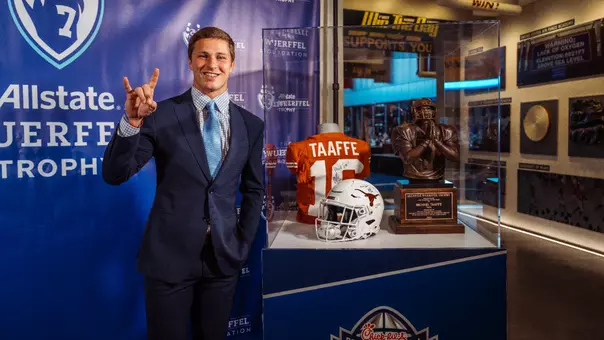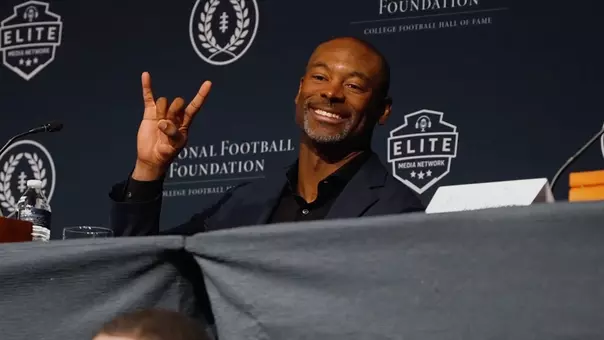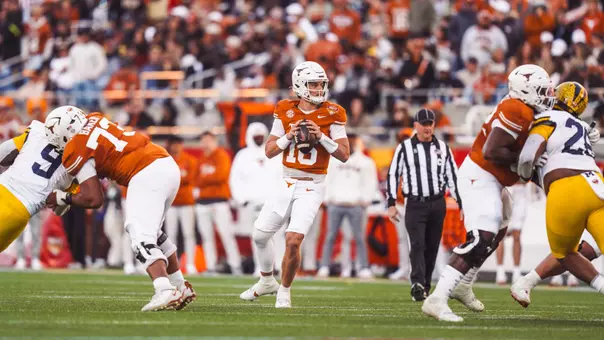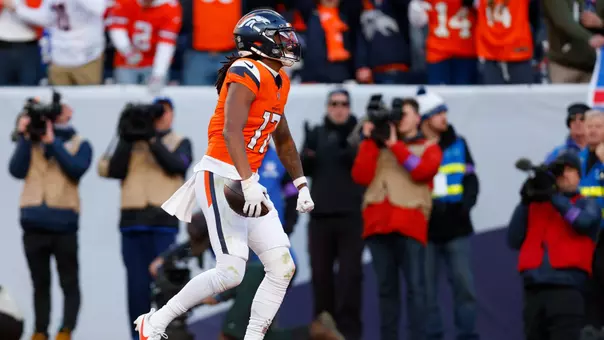The University of Texas at Austin Athletics
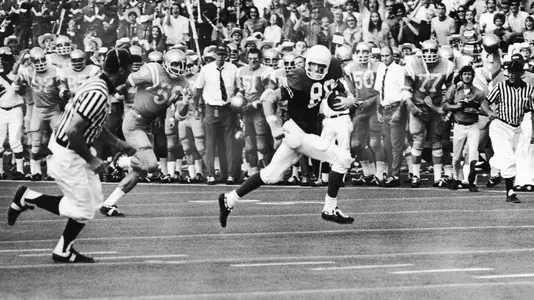
Late Game Heroics and a Miracle Play in Football’s 1970 Championship Season
11.24.2020 | Football
As UT celebrates the 50th Anniversary of its 1970 National Championship season, we take a look back at a memorable play that kept the Longhorns’ back-to-back title hopes alive.
By BILL LITTLE
This week we honor the 50th Anniversary of Texas' 1970 National Championship team. It was a truly special year that was highlighted by Darrell Royal and the Longhorns' second-straight national title, extended a lengthy winning streak and provided many great memories. We all know one play does not make a season or a game, but with a critical top-25 contest in the balance, a miraculous pass connection managed to keep hope alive in the 1970 stampede to another title.
To get to that critical play, we'll begin by setting the scene. Coach Royal and Texas, which had claimed its second national title in six years in 1969, were the talk of college football. The innovative "Wishbone Offense," which was devised in 1968 and featured a triple-option attack, had won impressively against any and all competition. Texas entered 1970 with a 20-game winning streak from 1968-69, a stretch in which its ground-and-pound attack had averaged nearly 350 yards rushing per game. The Longhorns ranked either No. 1 or No. 2 in the national polls for 15-straight weeks, and the only close calls came in capping the 1969 National Championship season with dramatic come-from-behind victories over No. 2 Arkansas in the "Game of the Century" and No. 9 Notre Dame in the Cotton Bowl Classic.
Texas opened the 1970 season much like they had in the previous 20 games, by rushing for better than 400 yards in a pair of decisive victories over Cal (56-15) and at Texas Tech (35-13). So, there was little reason to think that Coach Royal's juggernaut could be slowed down, and more of the same was expected as the No. 2 Longhorns welcomed No. 13 UCLA to Austin and Texas Memorial Stadium on October 3, 1970. But an unbeaten Bruins team led by veteran coach Tommy Prothro, loaded with talent and a unique defensive scheme, was up for the challenge of the mighty Longhorns despite being 22-point underdog.
That was the scene as 66,000 fans filled Texas Memorial Stadium for a rare, early-season 4 p.m. kickoff. The typical early October night game timing had been altered due to the removal of lights and construction of the upper deck on the stadium's west side, which would dramatically increase the Horns capacity at its home game venue.
The pundits figured that the late afternoon Texas heat would affect the Bruins, and by the season of 1970, Royal had become one of the most respected coaches in the college game. On the other side, however, was Prothro. For most of two years, he and his staff had studied Royal's unique offensive system, and now they had the opportunity to see if they could stop it. It take didn't long to find out.
One of the staples of the "Wishbone" attack called for the quarterback to fake to the fullback, then ride down the line for a blind pitch back to a trailing halfback. In the 1969 National Championship season, Royal and his crew had used that formation with such success that they gained 611 yards rushing in a single game against SMU. Eighty of their 90 plays were runs in that game and the Horns averaged 7.6 yards per carry in a 45-14 win over the Mustangs.
This time, the quarterback was Eddie Phillips, who had taken over for the legendary and undefeated signal caller James Street and would go on to become one of the best to ever play the option quarterbacks in his own rights. He took the snap, faked to All-American fullback Steve Worster, then rolled down the line to his left. He turned loose the pitch to the trailing back, as he had done hundreds of times before. This time, the ball hit the crashing UCLA defender squarely in the back of his helmet as he leveled the UT running back, Billy Dale, who was on the ground before the ball even got to where he was supposed to be.
"That defense was well-conceived and well-executed," Royal would say later. "UCLA brought some good people to town and they came in a bad humor."
And then he added, in his famed folksy humor from his days growing up during the 'Dust Bowl' in Oklahoma: "Tommy Prothro didn't come in on a load of wood, either. He knows something about this game."
Prothro's innovative defense stymied the Longhorns and eventually would cause Royal and his staff to adjust their offensive attack. In the moment, however, the more pressing issue for Royal and the Longhorns was finding a way to win this critical football game.
Bruins quarterback Dennis Dummit was superb as his team overcame a 13-3 Texas halftime lead. The win streak, the dream of back-to-back national championships, and all that went with it hung in the balance as, with Texas trailing, 17-13, late in the game, halfback Jim Bertelsen slipped on a fourth-down play and failed to convert with only 2:27 left. The Longhorn defense held, but by the time Texas got the ball back at its own 49-yard line, only 52 seconds remained. Two plays later, including a fumble that rolled out of bounds, UT faced a third-and-19 with the ball at the UCLA 45-yard line.
Just a bit more than a year before, Royal was best known as one of the most conservative coaches in the game. He joined Ohio State's Woody Hayes in his joking about the forward pass, and the fact that, "When you pass, three things can happen, and two are bad."
But after the famed fourth-down pass that set up the game-winning touchdown against Arkansas, and an equally successful short pass on a fourth-down play that beat Notre Dame, a lone UT staffer was in the press box elevator at the historic Cotton Bowl stadium. He was accompanied by an elevator operator who had seen all of the "ups and downs" of the game of college football since the stadium had opened more than 40 years before.
"Man," mused the attendant. "I sure would not want to get into a poker game with that Darrell Royal. He's a real riverboat gambler."
And so, at approximately 6:30 p.m., on the field that at the time was called Texas Memorial Stadium, Phillips took the snap and dropped back to pass. The sun was sinking over the shadow of structure that would become the upper deck on the west side. A group of 99 sports writers and broadcasters — all that a makeshift plywood structure that served as a temporary press box could hold — watched as tight end Tommy Woodard cut across the middle. A UCLA defender swiped at the ball in Phillips' hands, but missed.
Back toward the south end zone, All-American receiver Cotton Speyrer ran a deep post pattern, and as he jumped for the ball at the 20-yard line, a UCLA defensive back was poised to make the tackle. In another time and place, our story could end that way. But as the members of the media and staff fought the sunset to see what happened, their view was suddenly obliterated by a sea of glisten. From the student section on the east side, suddenly everything that was loose — most of it was full of ice and water and whatever one might have carried with them — came sailing into the setting sun.
Speyrer caught the ball and landed on his right foot. And as the UCLA defender went for a tackle, Cotton spun like a ballet dancer, and his first step came from his left foot as he turned toward the south end zone and ran untouched for the game winning touchdown. A cryptic photo, shot from the Texas sideline, shows the UCLA bench in the background, with a tall, stunned assistant coach, frozen in time, his mouth wide open.
Twelve seconds remained.
Hammered by a UCLA defender just seconds after he released the pass, Phillips picked himself up off the turf, never seeing the play's conclusion, but assured of its success by the roar of the crowd. Royal's memory was not unlike those from other successes, when he almost magically came up with the right play, and the right people, at the right time.
"You've got to go for something big and something good has to happen down there," he said.
The thrilling victory was the 23rd-straight for Texas, setting a Southwest Conference record. Learning important lessons from the miraculous finish, Royal and his staff adjusted the offensive scheme to include accounting for changes in opponents' defenses after the UCLA game, and by the time Texas ended the regular season facing the Arkansas team which narrowly lost in 1969, the 'Horns won going away, 42-7. In fact, Texas won its last three regular season games by scores of 58-0 (TCU), 52-14 (Texas A&M) and 42-7 (Arkansas). All totaled, that's Texas, 152, and those challengers, 21. Texas won a third-straight SWC Championship, and the Longhorns were ranked No. 1 in either The Associated Press or Coaches Poll for each of the final seven weeks of the season.
At the time, the coaches poll crowning of the national champions was awarded at the end of the regular season by United Press International, and bowl game results were not included in the vote. Ironically, that was how the polls worked partly because Notre Dame had not been a regular bowl game participant for more than 40 years prior to the 1970 Cotton Bowl classic where UT secured a 21-17 victory over the Irish to put the icing on a perfect 11-0 National Championship season in 1969.
So, with the winning streak reaching 30 games, the Longhorns were tabbed National Champions in the UPI Coaches Poll, their second-straight title. The streak was finally stopped in a rematch with No. 5 Notre Dame in the final game of that 1970 season at the Cotton Bowl, costing the Horns The AP national title, but national champs, nonetheless.
Six Longhorns from that 1970 squad were named All-American – consensus first-teamers defensive end Bill Atessis, fullback Steve Worster and offensive tackle Bob Wuensch, as well placekicker Happy Feller, linebacker Scott Henderson and the UCLA game hero, wide receiver Cotton Speyrer. Worster finished fourth in the Heisman Trophy balloting, and in addition to the All-Americans, halfback Jim Bertelsen and offensive guard Bobby Mitchell were tabbed All-SWC.
Royal would be recognized by ABC Sports as the Coach of the Decade for the 1960s. During his 20 years at Texas, his teams won three National Championships, finished in the nation's top five nine times, claimed 11 SWC titles and accumulated an overall record 167-47-5. That includes a 21-1 mark during the consecutive national crowns of 1969 and 1970.
The Longhorns' back-to-back championship runs evoke visions of their overpowering Wishbone Offense, and rightfully so. However, the 1969 team was also remembered for a fourth-quarter comeback at Arkansas and the memorable fourth-down pass from Street to Randy Peschel that ignited it, as well as a Street to Speyrer fourth-down completion in the win over Notre Dame in the Cotton Bowl. Like those plays that capped the 1969 season and the 499th and 500th victories in Texas history, on a sunny day in Austin in 1970, it was Phillips' improbable connection with Speyrer that would be such a big part of the tale of the 1970 National Champions.


